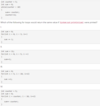Module 04: Iteration Flashcards
(40 cards)
What would the method call myMethod(“Karel The Dog”, ‘e’) output?

3
What kind of error would the method call myMethod(“Frog”) cause?
public void myMethod(String x)
{
for(int i = 0; i <= x.length(); i++)
{
System.out.println(x.substring(i, i+1));
}
}
- Compile Time Error: Missing return value
- Runtime Error: String index out of range
- Compile Time Error: Unexpected return value
- Compile Time Error: Syntax Error in method definition
- Runtime Error: String index out of range
What will the call to the method funWithNumbers(314159) print to the screen?

314159
What does the call to the method someMethod(3,1) output?

10
What will the call to method patternGrid(3,4,’#’) print?

####
####
####
What would the call to method divideByTen(340) output?
public int divideByTen(int num)
{
while(num / 10 >= 10)
{
num /= 10;
}
return num;
}
34
Consider the following method:
What is returned as a result of the call mystery(“Lunchbox”, 4)?

xoxbox
Consider the following code segment:
int x = 10;
int y = 2;
int count = 1;
while(x > y)
{
x /= y;
count++;
}
What will the value of count be after executing the code segment?
3
What will the final result be when run in the console?

* * * *
* * *
* *
*
Consider the following code segment:
String word = “Cafeteria”;
for(/* missing condition */)
{
System.out.print(word.substring(i+1,i+2) + “ “);
}
The code segment is intended to print every other letter in the word, starting with index 0, to produce the result C f t r a. Which of the following can be used to replace /* missing condition */ so that the code segment works as intended?
- int i = 0; i < word.length(); i+=2
- int i = -1; i < word.length(); i+=2
- int i = 0; i < word.length(); i++
- int i = -1; i <= word.length(); i+=2
- int i = word.length() - 1; i < -1 ; i-=2
- int i = -1; i < word.length(); i+=2
Consider the following code segment:
Which of the following for loops would return the same value if System.out.println(sum) were printed?
III only
II, III and IV
II only
II and III
III and I

II and III
Consider the following method:
What would the value of sum be after the method call countPs(“Peter Piper picked a pack of pickled peppers”)?
9
How many times will the word “Heyo!” be printed in the following code segment?

15
Consider the following code segment:
int num = 8;
for(int i = num; i > 0; i -= 3) //Line 2
{
System.out.print(“ “ + i + “ “);
}
Which of the following best explains how changing i > 0 to i >= 0 will change the result?
- An additional value will be printed, as the for loop will iterate one additional time.
- There will be no change in the program because the for loop will iterate the same number of times.
- One fewer value will be printed, as the for loop will iterate one fewer time.
- This program will result in an infinite loop, as the condition will never be false.
- There will be no change in the program because the for loop will iterate the same number of times
Consider the following method:
What value word would be printed as a result of the call mix(“Hippopotamus”, “p”)?
Hi0o0tamus
Consider the following incomplete code segment, which is intended to increase the value of each digit in a String by one. For example, if num is 12345, then the resulting String would be 23456.
Which of the following should replace /* Missing Loop Header */ so that the code segment works as intended?
- counter < num.length() - 1
- counter <= num.length()
- counter < num.length()
- counter > num.length()
- counter < num.indexOf(counter)

- counter < num.length()
Consider the following code segment:
Which of the following best explains the result of changing j < 4 to j > 4 on line 1?
- The numbers will be printed in reverse order compared to the original because the outer loop will occur in reverse order.
- The program will produce the same result, as the number of iterations in the outer loop hasn’t changed.
- An infinite loop will occur because the termination of the loop will never be reached.
- No output will be produced, as the boolean condition will never be met in the outer for loop.

- No output will be produced, as the boolean condition will never be met in the outer for loop
What, if anything, is printed as a result of executing this statement?
- 150
- 310
- 10204080
- 10204080160
- There will not be any result printed, as ints cannot be converted to type String.

- 10204080
What are while loops?
while (boolean expression)
{
//code executes until false
}
What are infinite loops?
Occurs when the expression in a while loop never evaluates to false. The program continues to run infinitely
What is the purpose of “break?”
Breaks out of a while loop and executes statement that immediately follows while loop
What is the purpose of return?
Keyword used in methods to return a value back to the initial program that called the method
How can you avoid infinity loops?
- Add a condition to the while loop
- Add a “break” statement
- Add a return keyword
What are for loops?
- Another tool we can use to repeat code sequences
- for loops allows repeating a set of statement a specfic number of times!
for(variable initialization; boolean expression; increment)
{
//will execute if boolean is true, and until the boolean expression is false
}
- variable initialization: The initialization; this variable controls the for loop execution
- boolean expression: if the expression is false, the for loop will not execute
- increment: changes the value of the loop control variables





